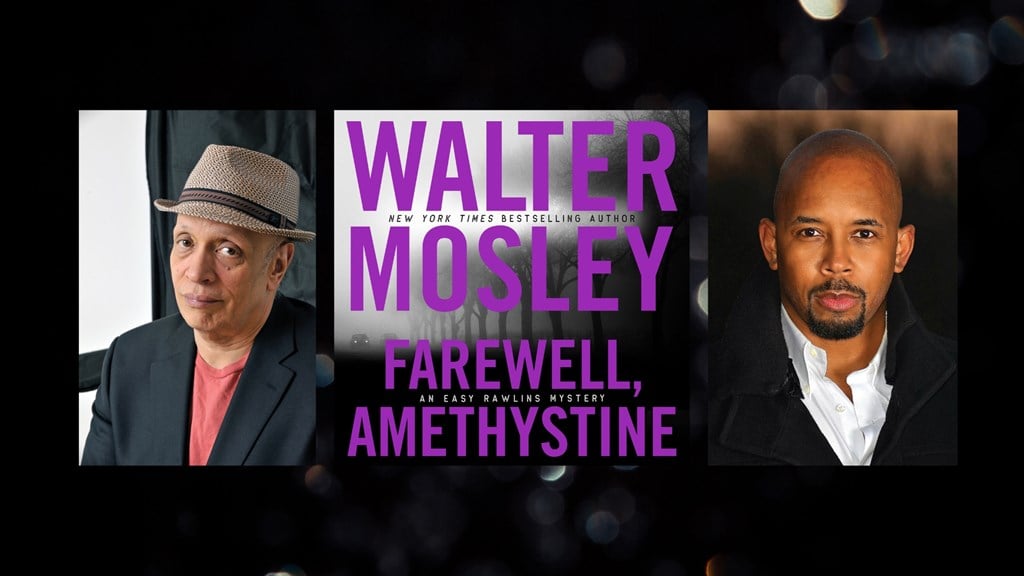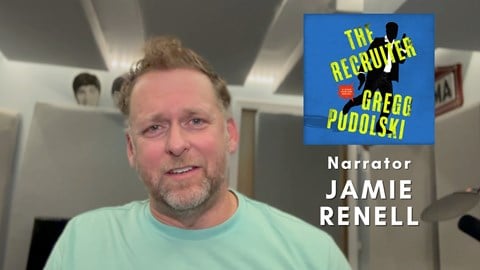AudioFile’s Michele Cobb spoke with author Walter Mosley and actor and narrator Michael Boatman about their longtime audiobook partnership, including the most recent Easy Rawlins mystery, FAREWELL, AMETHYSTINE. What is it like for an author and a narrator to revisit characters over years as they change and age? Watch the complete interview in the video below.
Partial Transcript:
Michele Cobb: Let’s talk a little bit about Easy Rawlins. DEVIL IN A BLUE DRESS was published 34 years ago. When we meet Easy in DEVIL IN A BLUE DRESS, it’s 1948. World War II is over, and he’s returning as a serviceman looking for a new start, which for him means leaving Houston and going to L.A. I would love for you, Walter, to tell us a little bit about what happens in this new book, which is set in the 1970s.
Walter Mosley: Easy has been on his own most of his life, and therefore has trouble. Doesn’t have trouble starting relationships or getting into them, but he has troubles keeping them, and in this book he meets somebody. Easy has found the wrong woman again and he’s going to have to pay for that to some degree, but I think it marks a change in his life. There’s many other parts of the story. There’s Melvin Suggs, who’s a policeman, who is married to the wrong woman, and because of her he’s gotten in trouble and the police want to get rid of him. And Easy says, “Well, listen, if I can help you out of this trouble with the police and you can get your position back, maybe you can help me with my problem.”
MC: Walter, you have such great characters in your books, but I think people often think of the city of L.A. as a character. And I’m curious, what about 1970s L.A. did you want Easy to encounter or be challenged by in this book?
WM: In FAREWELL, AMETHYSTINE, in the first chapter, Mouse, who is the deadliest man in Los Angeles, is having a argument with Whisper, who Easy considers the best detective in Los Angeles, both Black men, and they’re arguing about the UC system trying to fire Angela Davis, because Angela Davis is a communist, and that introduces me so easily into the ’70s. To be able to write about it is just a great deal of fun.
MC: Michael, you have this amazing history recording many of these titles over time, so how is it to return over and over to this character, and have you changed the way you voiced him over all these years?
Michael Boatman: I’m always happy when I get the call that there’s a new Easy Rawlins book because I know that it’s going to be a big jump in time. And as an actor, you start thinking, “Well, how can I embody that this man is now 60 years old?” As I’ve aged, Easy has aged in the books, and it sort of naturally happens. There’s a cadence that I’m very familiar with, from the men in my family, sort of a slow smokiness, but also, I always think of it as a comforting voice, a voice that is not only our protagonist but our storyteller. So I always aim for the voice to be soothing, because there’s a lot of disturbing stuff that’s about to happen that the reader’s about to experience, and yet because of Easy’s confidence as a character, you know he’s got it well in hand. I think that over the years I’ve tried to embody that a little more with each and every book. There’s definitely a voice that comes out of me, naturally, I would say, and that voice has obviously grown more comfortable for me as time has gone on. But what I also love about it is I’ve lived and worked in L.A. I live in New York now, but I’m always in L.A. I’ve been back and forth there between 35 years. Walter, to me, you capture L.A. better than any other author that I can name. Place is hard, and you’re a master of it. So it makes it very easy to imagine yourself, you know, in Malibu. Easy’s house, which is one of the most amazingly described and yet concrete places I’ve ever read about, I know that house. I know the hill. I know the guys at the bottom of the hill, the Russian guys who go up. I always am amazed at your ability to render place in that way. Great writing speaks itself if you just let it stay out of the way and allow the images to come.
WM: There’s all those different sections to writing. It’s character development, it’s plot, it’s language in general, but also for me, it’s always been who’s telling the story. And it doesn’t matter if it’s first person or third person or universal. Doesn’t really matter, because whatever, you have to go through these people who are going into the house, walking down the street, feeling it. I find my way into place by the characters, by following the character into that place. You know what I’m saying?
MB: Yeah, I do. Yeah, you’re great at it. You’re great on all of those points. Plot, of course, and character development, everything. But I just marvel at your ability to render a place so that you feel as the reader I’m there. I’m in it. I get it.
--
Walter Mosley photo by Marcia Wilson.
AudioFile Magazine is your #1 source for audiobook reviews.







